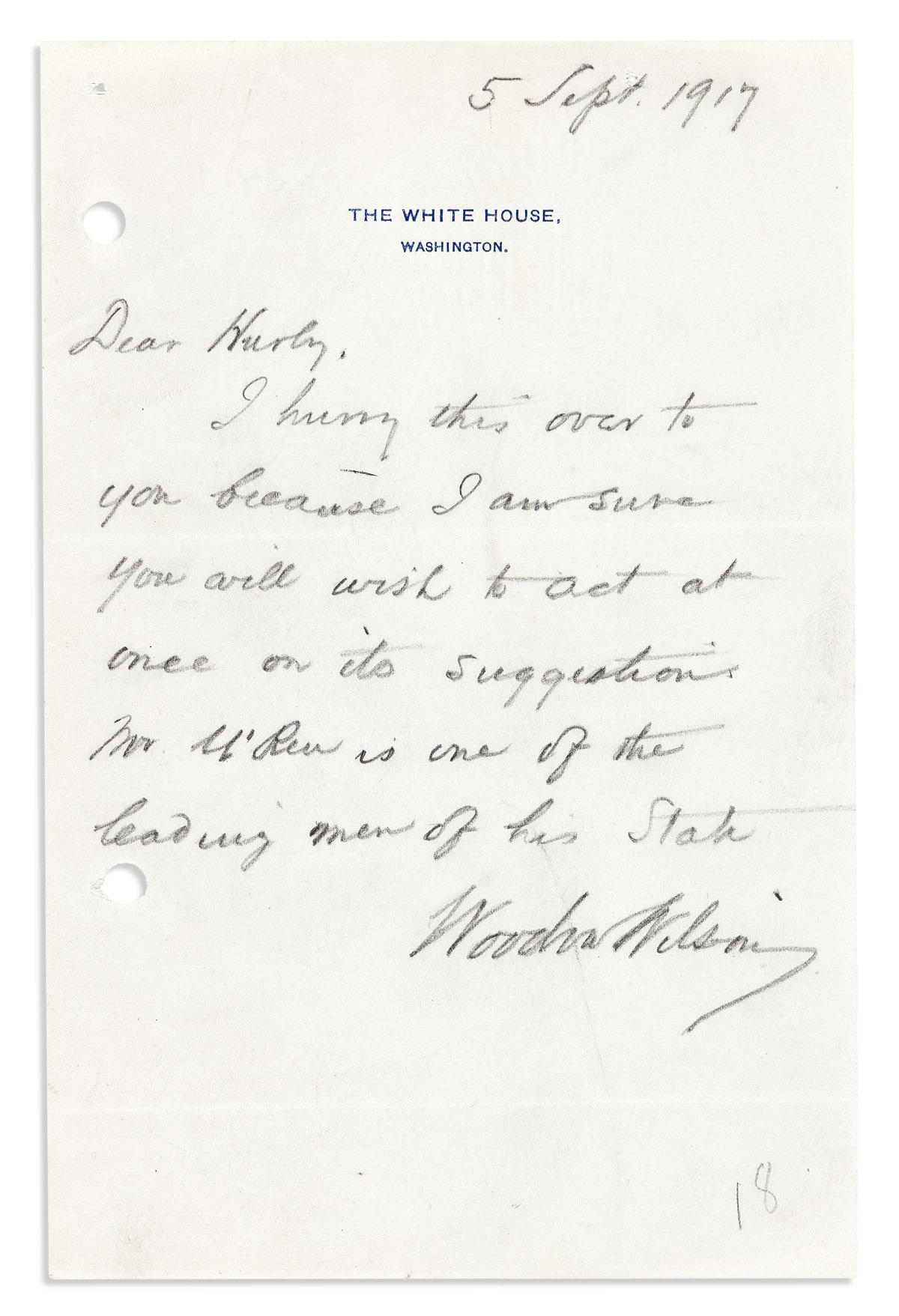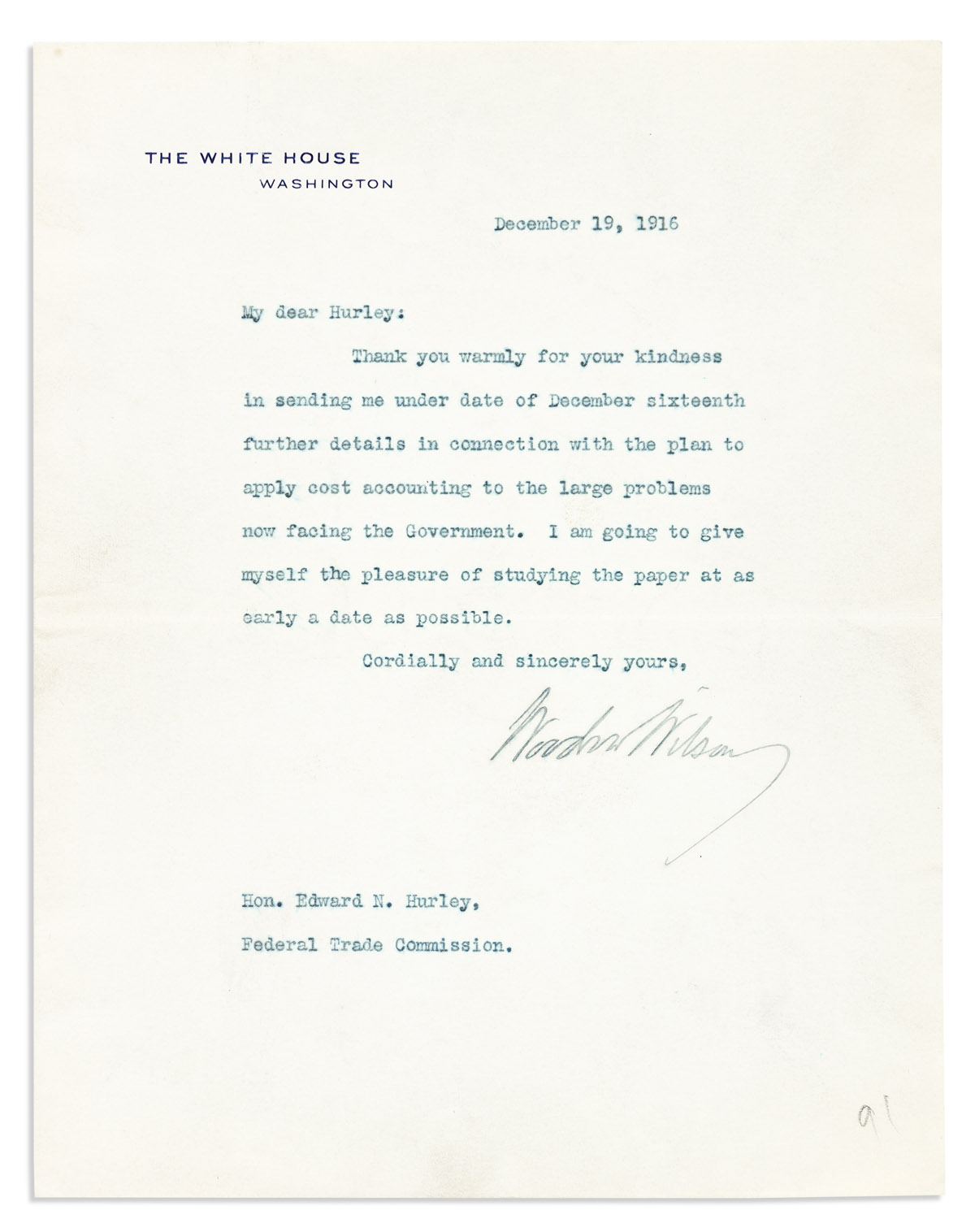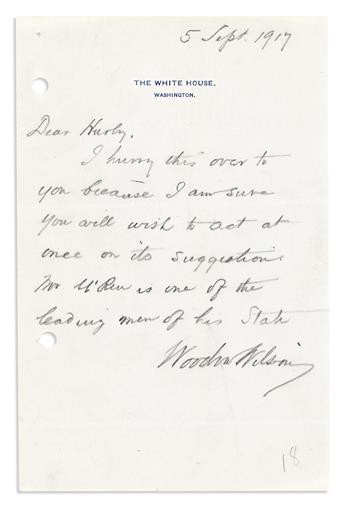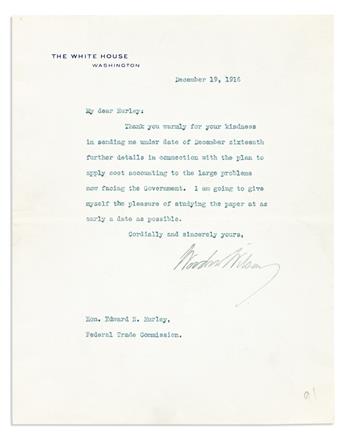Sale 2609 - Lot 192
Price Realized: $ 16,000
Price Realized: $ 20,000
?Final Price Realized includes Buyer’s Premium added to Hammer Price
Estimate: $ 15,000 - $ 25,000
ARCHIVE OF LETTERS WRITTEN FROM WHITE HOUSE DURING FIRST WORLD WAR WILSON, WOODROW. Extraordinary archive of over 60 letters Signed, nearly all as President, to the Chairman of both the Federal Trade Commission and later the U.S. Shipping Board Edward N. Hurley, including mostly Typed Letters and one Autograph Letter, on mostly business topics, including accepting his resignation from the FTC, discussing candidates for the FTC or the Red Cross War Council or other organizations, arranging meetings, discussing issues relating to wartime commercial shipping including a plot to destroy American and British ships, arranging for assistance to other countries during and after the war, etc. Together over 70 pages, 4to or small 4to, White House or "American Commission to Negotiate Peace" or personal stationery, most with integral blank; slight feathering to some signatures, generally good condition. Washington or Paris, 1916-23
Additional Details
12 May 1916: "Your Boston speech is before me, in which you outline some of the work which the Federal Trade Commission is doing for the business men of the country. I wish to commend . . . your endeavor to assist the small manufacturer and merchant . . . .
"Your suggestion that trade associations . . . and other similar organizations should be encouraged . . . by the Government seems to me a very wise one. . . . These associations, when organized for the purpose of . . . unifying cost accounting and bookkeeping methods, standardizing products and processes of manufacturer, should meet with the approval of every man interested in the business progress of the country. . . .
"If we are to be an important factor in [the] world's markets, we must be more thorough and efficient in production. . . ."
2 August 1917: "Here is some additional evidence . . . with regard to the necessity of getting as soon as possible, directly or indirectly, at the matter of ocean freight rates. I have no doubt that you have the matter as much at heart as I have."
21 August 1917: ". . . If . . . any practical suggestions occur to you, I would be very much obliged if you would personally confer with the members of the War Industries Board to see what if anything will be effective to meet the situation which Governor [of Washington, Ernest] Lister here anxiously outlines [possibly relating to local disruptions caused by International Workers of the World]."
29 August 1917: ". . . Our ship owners are not cooperating with us as they should in the adoption of measures of safety and protection and I think their failure to cooperate ought to receive some very public form of rebuke. . . ."
5 September 1917, ALS, in pencil: "I hurry this over to you because I am sure you will wish to act at once on its suggestion. Mr. McRees[?] is one of the leading men of his State."
9 October 1917: "Thank you for your letter about Mr. Stevens' proposal to establish American corporations, foreign owned, to take back the foreign-built ships commandeered by the Shipping Board. I find myself in entire agreement with your memorandum on the subject."
16 January 1918: "I have just received a letter from a man whom I do not know, . . . which contains one piece of information which I do not feel that I can take the risk of passing by . . . . He states . . . that there is a carefully concerted plot on the part of all the pro-German and anti-American agencies in this country, including those disaffected elements among the Irish-Americans who are thought to be cooperating with such agencies, for a general effort to destroy American and British shipping in every port, in every ship yard, and at sea, and that the date set is the twenty-second of this month . . . ."
26 January 1918: ". . . The electrical welding accomplished such wonders in the rapid repair of the extensive injuries done to the German ships which we took over that I can easily see its use might be almost infinitely extended."
12 February 1918: ". . . [T]he Dutch Government is very much embarrassed . . . by the publication of such announcements as appeared . . . for example, in the New York Times, headed, 'Will free ships for our troops.' . . . It unfortunately happens that what is good news for our people is sometimes bad news for our State Department . . . . It occurs to me that it would be feasible for your representative on the War Trade Board to confer with the representative of the State Department on that board with regard to such matters. . . ."
5 March 1918: "I hereby authorize you to refuse all further transportation for the importation of sugar to the sugar refiner, Mr. C.A. Spreckels. . . . [who] refused to sign the contract with the Food Administration which was necessary for the protection of the sugar supply . . . ."
29 March 1918: "I am sure you will be interested in reading the . . . letter from the Secretary of the Treasury [Wilson's son-in-law William Gibbs McAdoo, who] . . . . was the member of the Cabinet chiefly active in the Pan-American Conference . . . . [who] himself visited the Latin-American countries in person in connection with the work of that Congress. I am inclined to think that he is right . . . ."
10 April 1918: "Mr. William Fellowes Morgan . . . . wrote me the other day that he didn't think the country was sufficiently alive to the need for ships. . . ."
6 May 1918: "A good deal of embarrassment and dislocation in the administrative business of the Government has been caused by the transfer of clerks and specialists of one sort or another form the older and longer established departments to the new instrumentalities which have necessarily been created or greatly enlarged since this country entered the war . . . . [I]t has often happened that employees of the older departments have been drawn away by offers of considerable increases of pay . . . sometimes to the serious weakening, of the departments . . . ."
24 May 1918: "In a talk the other day . . . the Chairman of the House Committee on Appropriations . . . suggested the desirability of having a proper audit system worked out between the Emergency Fleet Corporation and the Treasury Department to cover the expenditures of the Corporation. Of course, the Corporation is using its own auditors now . . . but it would assist the Committee on Appropriations, and, I think, strengthen the whole business with them if the system of audit could be coordinated with that of the Treasury . . . ."
8 August 1918: "My judgment is that we ought to continue the practice . . . of giving free shipment to freight from the Red Cross and for Red Cross uses. . . ."
3 September 1918: ". . . I . . . request: that the commandeering power should not hereafter be exercised over any of the material industries or industrial agencies of the country without first consulting the Chairman of the War Industries Board. . . ."
7 September 1918: "I have your letter . . . about communicating plans and specifications for steel, wooden, and concrete ships to the governments of the countries with which we are associated.
". . . I think that as a general principle it is wise to be as generous and liberal as we can be without endangering the essential interests of the country, and I should assume that it was safe and right to let friendly cooperating governments have these plans and specifications when they ask for them."
9 September 1918: ". . . I am deeply interested to learn that Lord Reading purposes [sic] having a conference with you about pooling our shipping with the British after the war. That is an extraordinary proposition, and I think perhaps it would be wise to tell him that we are sure that it will not be possible for us to make special arrangements with any one nation . . . ."
9 October 1918: ". . . The government has been acquiring a great deal of property of one sort or another in connection with the prosecution of the war and of the industries incident to it, and I am writing to ask if you cannot assign . . . the duty of studying the question how that property is to be disposed of to the greatest advantage after the war is over . . . ."
6 November 1918: "In view of the approaching evacuation of Belgium [by retreating German troops] and the new problems that confront this unfortunate people, I have asked Mr. Hoover to expand the activities of the Commission for Relief in Belgium to cover the entire relationship of this government, and possibly that of other governments, together with all American public charity, to the whole business not only of food but also clothing, raw material, tools, machinery, exchange and other economic relief involved in the reconstruction of Belgium. . . ."
27 January 1919, Paris: "You are no doubt right about the objects of the French Naval League and I entirely approve of the suggestion you make . . . ."
"Your suggestion that trade associations . . . and other similar organizations should be encouraged . . . by the Government seems to me a very wise one. . . . These associations, when organized for the purpose of . . . unifying cost accounting and bookkeeping methods, standardizing products and processes of manufacturer, should meet with the approval of every man interested in the business progress of the country. . . .
"If we are to be an important factor in [the] world's markets, we must be more thorough and efficient in production. . . ."
2 August 1917: "Here is some additional evidence . . . with regard to the necessity of getting as soon as possible, directly or indirectly, at the matter of ocean freight rates. I have no doubt that you have the matter as much at heart as I have."
21 August 1917: ". . . If . . . any practical suggestions occur to you, I would be very much obliged if you would personally confer with the members of the War Industries Board to see what if anything will be effective to meet the situation which Governor [of Washington, Ernest] Lister here anxiously outlines [possibly relating to local disruptions caused by International Workers of the World]."
29 August 1917: ". . . Our ship owners are not cooperating with us as they should in the adoption of measures of safety and protection and I think their failure to cooperate ought to receive some very public form of rebuke. . . ."
5 September 1917, ALS, in pencil: "I hurry this over to you because I am sure you will wish to act at once on its suggestion. Mr. McRees[?] is one of the leading men of his State."
9 October 1917: "Thank you for your letter about Mr. Stevens' proposal to establish American corporations, foreign owned, to take back the foreign-built ships commandeered by the Shipping Board. I find myself in entire agreement with your memorandum on the subject."
16 January 1918: "I have just received a letter from a man whom I do not know, . . . which contains one piece of information which I do not feel that I can take the risk of passing by . . . . He states . . . that there is a carefully concerted plot on the part of all the pro-German and anti-American agencies in this country, including those disaffected elements among the Irish-Americans who are thought to be cooperating with such agencies, for a general effort to destroy American and British shipping in every port, in every ship yard, and at sea, and that the date set is the twenty-second of this month . . . ."
26 January 1918: ". . . The electrical welding accomplished such wonders in the rapid repair of the extensive injuries done to the German ships which we took over that I can easily see its use might be almost infinitely extended."
12 February 1918: ". . . [T]he Dutch Government is very much embarrassed . . . by the publication of such announcements as appeared . . . for example, in the New York Times, headed, 'Will free ships for our troops.' . . . It unfortunately happens that what is good news for our people is sometimes bad news for our State Department . . . . It occurs to me that it would be feasible for your representative on the War Trade Board to confer with the representative of the State Department on that board with regard to such matters. . . ."
5 March 1918: "I hereby authorize you to refuse all further transportation for the importation of sugar to the sugar refiner, Mr. C.A. Spreckels. . . . [who] refused to sign the contract with the Food Administration which was necessary for the protection of the sugar supply . . . ."
29 March 1918: "I am sure you will be interested in reading the . . . letter from the Secretary of the Treasury [Wilson's son-in-law William Gibbs McAdoo, who] . . . . was the member of the Cabinet chiefly active in the Pan-American Conference . . . . [who] himself visited the Latin-American countries in person in connection with the work of that Congress. I am inclined to think that he is right . . . ."
10 April 1918: "Mr. William Fellowes Morgan . . . . wrote me the other day that he didn't think the country was sufficiently alive to the need for ships. . . ."
6 May 1918: "A good deal of embarrassment and dislocation in the administrative business of the Government has been caused by the transfer of clerks and specialists of one sort or another form the older and longer established departments to the new instrumentalities which have necessarily been created or greatly enlarged since this country entered the war . . . . [I]t has often happened that employees of the older departments have been drawn away by offers of considerable increases of pay . . . sometimes to the serious weakening, of the departments . . . ."
24 May 1918: "In a talk the other day . . . the Chairman of the House Committee on Appropriations . . . suggested the desirability of having a proper audit system worked out between the Emergency Fleet Corporation and the Treasury Department to cover the expenditures of the Corporation. Of course, the Corporation is using its own auditors now . . . but it would assist the Committee on Appropriations, and, I think, strengthen the whole business with them if the system of audit could be coordinated with that of the Treasury . . . ."
8 August 1918: "My judgment is that we ought to continue the practice . . . of giving free shipment to freight from the Red Cross and for Red Cross uses. . . ."
3 September 1918: ". . . I . . . request: that the commandeering power should not hereafter be exercised over any of the material industries or industrial agencies of the country without first consulting the Chairman of the War Industries Board. . . ."
7 September 1918: "I have your letter . . . about communicating plans and specifications for steel, wooden, and concrete ships to the governments of the countries with which we are associated.
". . . I think that as a general principle it is wise to be as generous and liberal as we can be without endangering the essential interests of the country, and I should assume that it was safe and right to let friendly cooperating governments have these plans and specifications when they ask for them."
9 September 1918: ". . . I am deeply interested to learn that Lord Reading purposes [sic] having a conference with you about pooling our shipping with the British after the war. That is an extraordinary proposition, and I think perhaps it would be wise to tell him that we are sure that it will not be possible for us to make special arrangements with any one nation . . . ."
9 October 1918: ". . . The government has been acquiring a great deal of property of one sort or another in connection with the prosecution of the war and of the industries incident to it, and I am writing to ask if you cannot assign . . . the duty of studying the question how that property is to be disposed of to the greatest advantage after the war is over . . . ."
6 November 1918: "In view of the approaching evacuation of Belgium [by retreating German troops] and the new problems that confront this unfortunate people, I have asked Mr. Hoover to expand the activities of the Commission for Relief in Belgium to cover the entire relationship of this government, and possibly that of other governments, together with all American public charity, to the whole business not only of food but also clothing, raw material, tools, machinery, exchange and other economic relief involved in the reconstruction of Belgium. . . ."
27 January 1919, Paris: "You are no doubt right about the objects of the French Naval League and I entirely approve of the suggestion you make . . . ."
Exhibition Hours
Exhibition Hours
Aliquam vulputate ornare congue. Vestibulum maximus, libero in placerat faucibus, risus nisl molestie massa, ut maximus metus lectus vel lorem.






